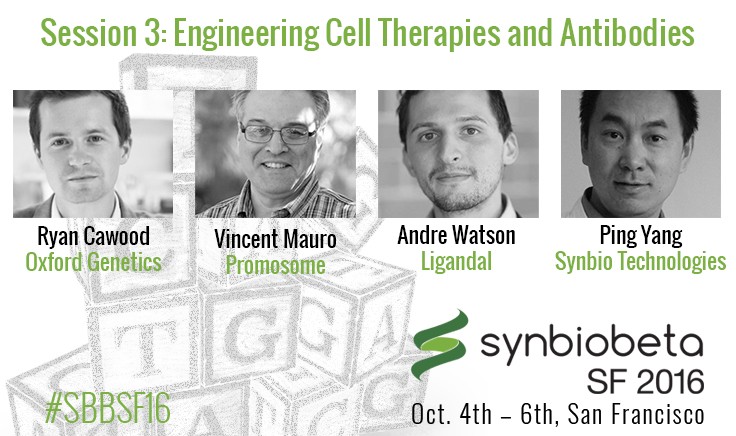Engineered Human Therapies
How Engineered Cell Therapies and Antibodies Are Transforming Personalized Medicine
Everybody has been hearing that we are transitioning into an age of personalized medicine, but what does that really mean? In this session, titled “Engineered Cell Therapies and Antibodies,” four leaders in the field, Dr. Vincent Mauro from Promosome, Dr. Ping Yang from Synbio Technologies, Dr. Andre Watson from Ligandal, and Dr. Ryan Cawood from Oxford Genetics, will describe what personalized medicine means from their perspective and how their companies are facilitating that transition.Personalized medicine is the precise determination of a particular ailment for a particular individual coupled with a customized treatment for said ailment and individual. There are several approaches to achieve this goal, however this session is specifically centered on the technologies that allow the body itself to fight off diseases. For example, immunotherapy is a hot new field whereby the immune cells are isolated from a subject, genetically modified to target specific cells or to be resistant to certain drugs, and re-injected into the subject. While the field is still young, the results have thus far been very promising. However, this technique is performed ex vivo, which presents its own set of challenges. Clinicians would like to bring the therapies closer to home using in vivo techniques, which require the development of novel technologies.In order to consider therapeutics, a framework might be helpful which outlines three key areas of technological development: targeting, delivery, and payload. Targeting has traditionally been, and still is in many cases, very non-specific. The idea was that if you blasted the body with a certain drug, hopefully a fraction of the drug would hit the target and be effective. Unfortunately, that also means that a large fraction of the drug will hit and damage other cells, causing off-target side effects. This is one of the problems that Dr. Ping Yang is tackling at Synbio Technologies. Yang states that Synbio Technologies is developing “next generation DNA technologies and the usage of these technologies to design and manufacture better antibodies.” Antibodies are small molecules that are able to bind very specifically to the particular molecules the antibodies were designed for; the production of antibodies by your immune system is typically how your body identifies foreign particles. Therefore, if you are able to identify a unique marker on the surface of a tumor cell, for example, you can develop antibodies that can specifically target that tumor cell and leave other cells alone. By focusing on improved antibody design and function, Synbio Technologies is pushing the development of a targeting system for therapeutics.The second key area of technological development is the delivery of the therapeutic. The body is a complex environment and each delivery mode has its own set of challenges, whether it be orally or intravenously. The challenge in any of these environments is how do we get the payload to the target: 1) without being detected by the immune system, 2) without being degraded or otherwise being made inert by the chemical environment of the delivery path, 3) without being filtered out by the liver or the kidneys, while making sure the payload is actually delivered when the target is reached and over the correct duration.The delivery issue is being tackled by both Dr. Ryan Cawood from Oxford Genetics and Dr. Andre Watson from Ligandal. While there are several types of delivery systems to get a payload into the cell, two stand out: viruses and nanoparticles. Oxford Genetics tends to focus on virus delivery systems, which are particularly useful for gene therapy applications. A virus can be loaded with a particular DNA segment and the associated molecular machinery to edit the gene sequence of the cell itself, or to allow the cell to express a protein product that might be toxic to the cell. However, using viruses as delivery vehicles comes with its own host (pun intended) of issues, including safety, reliability, and customizability. Nanoparticles on the other hand, the technology that Ligandal is focusing on developing, can be loaded with multiple different payloads, including gene therapies and more traditional chemical toxins. The mechanism behind the production of nanoparticles is more associated with materials science.Lastly, the third area of technological development is the payload, which is the molecule actually providing the therapy. Lots of different payloads have been developed throughout the years by different pharmaceutical companies, most of which have been broad spectrum drugs and toxins. However, we are moving into an age of DNA and RNA based therapies to very precisely target different disease states. This is the area that Dr. Vincent Mauro from Promosome focuses on. Promosome is designing and tweaking mRNA molecules in order to improve the expression of the gene in the delivered cell, which in turn improves the overall therapeutic efficacy of the treatment.By combining novel, synthetic biology based technologies in the areas of targeting, delivery and payload, these companies are helping to propel us forward into the age of personalized medicine by allowing us to very precisely develop therapeutics that are customizable to an individual and their particular disease state.Be sure to attend SynBioBeta SF 2016 this October to hear from these exciting companies in the Engineered Cell Therapies and Antibodies session held on October 4th.


















